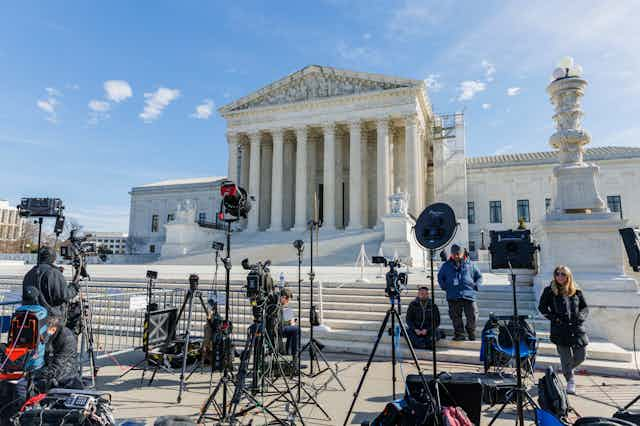The U.S. Supreme Court has ruled, in a unanimous decision, that the state of Colorado cannot bar former President Donald Trump from appearing on Colorado’s presidential ballot under the provisions of Section 3 of the 14th Amendment to the U.S. Constitution.
The text of Section 3 of the 14th Amendment states, in full:
“No person shall be a Senator or Representative in Congress, or elector of President and Vice-President, or hold any office, civil or military, under the United States, or under any State, who, having previously taken an oath, as a member of Congress, or as an officer of the United States, or as a member of any State legislature, or as an executive or judicial officer of any State, to support the Constitution of the United States, shall have engaged in insurrection or rebellion against the same, or given aid or comfort to the enemies thereof. But Congress may by a vote of two-thirds of each House, remove such disability.”
The ruling said states may decide who is eligible to hold state offices, but only Congress may decide who is eligible to hold federal offices.
Writing for The Conversation U.S. as far back as 2021, several scholars have explained aspects of this part of the Constitution, how it was intended, and the legal and political considerations surrounding its function. They give context to the court’s ruling and what it means for the country now.

1. A relatively recent development
In early 2021, Gerard Magliocca, a law professor at Indiana University, pointed out that up until that time, “Section 3 of the 14th Amendment was an obscure part of the U.S. Constitution.”
But this provision had an important purpose, he wrote:
“It prohibits current or former military officers, along with many current and former federal and state public officials, from serving in a variety of government offices if they ‘shall have engaged in insurrection or rebellion’ against the United States Constitution.”
The Supreme Court’s ruling did not decide whether Trump had or had not engaged in insurrection.
2. Justices focused on potential for national disarray
During oral arguments on Feb. 8, 2024, several members of the Supreme Court focused on the fact that this case was about a Colorado decision to bar Trump from the ballot, which suggested that other states might come to their own conclusions if the court didn’t deliver a clear message that would apply nationwide.
As Notre Dame election law scholar Derek Muller observed:
“States are the ones who have the primary responsibility of running presidential elections. And Colorado was leaning very heavily into this authority they have over which candidates to list on the ballot and how that can vary from state to state. The pushback from the Supreme Court in this case was to say, in essence, you’re not dealing with local or state interests, you’re not dealing with these state-specific procedures for how you list candidates on the ballot. You are interpreting a provision of the U.S. Constitution, and then you are applying it in your own state in a way that could affect what happens in other states.”

3. The importance of consensus
The court appears to have taken pains to get to a unanimous decision. Muller anticipated such a move. He said it was likely because of the potential effect on elections:
“This is a binary choice that either empowers the Republican candidate or prevents voters from choosing him. So when you have a choice in such stark, political and partisan terms, whatever the Supreme Court is doing is often going to be viewed through that lens by many voters. … (T)here will be as much effort as possible internally on the court to reach a consensus view to avoid that appearance of partisanship on the court, that appearance of division on the court. If there’s consensus, it’s harder for the public to … point the finger at one side or another.”
This story is a roundup of articles from The Conversation’s archives.

